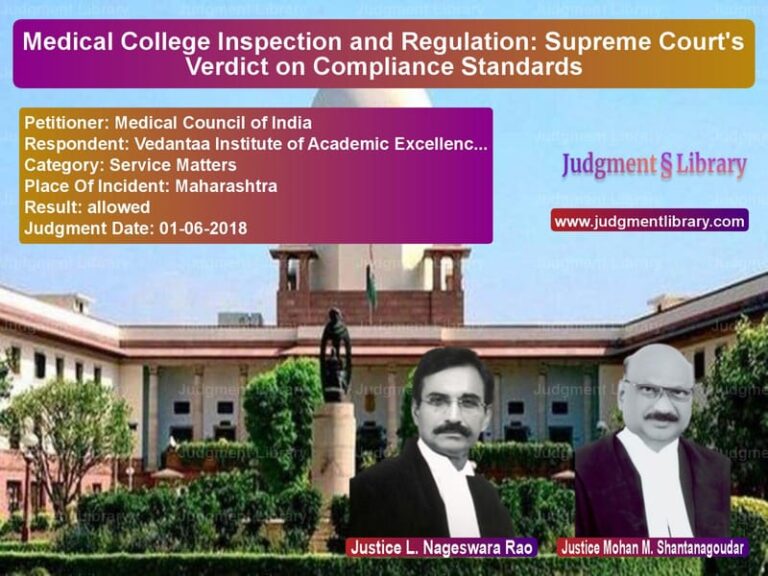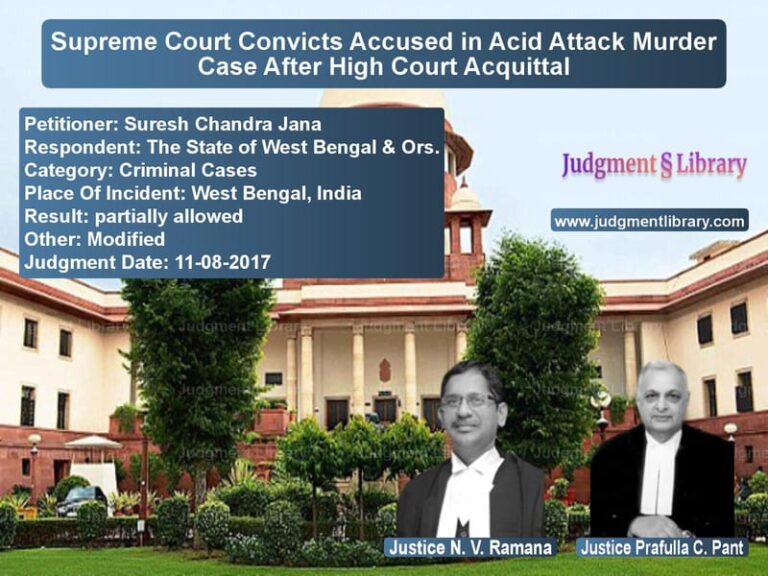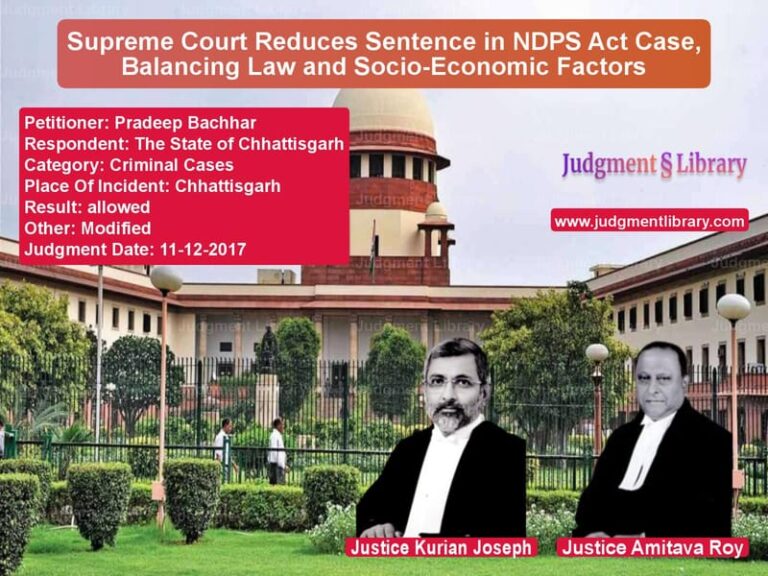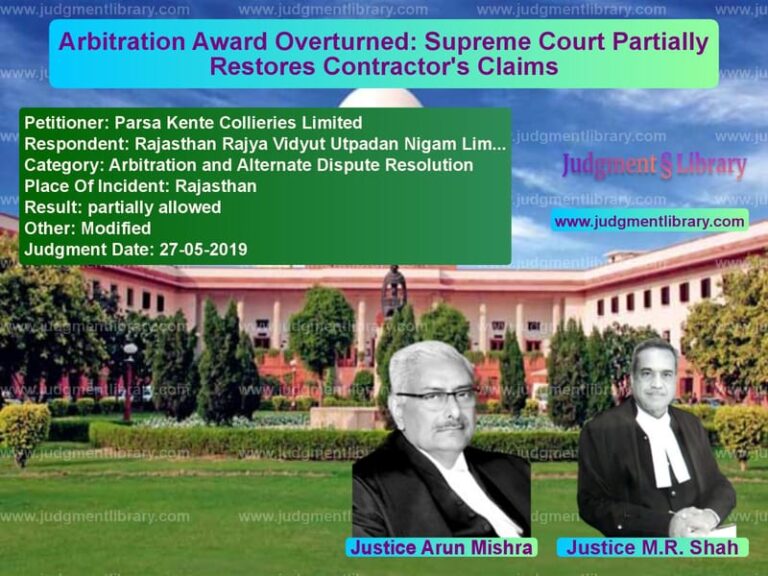BCCI Reforms: Supreme Court Upholds Lodha Panel Recommendations for Cricket Governance
The Supreme Court of India, in a landmark ruling, upheld the recommendations made by the Lodha Committee regarding reforms in the administration of the Board of Control for Cricket in India (BCCI). The judgment, delivered on August 9, 2018, pertains to a series of legal challenges and compliance issues arising from the reforms proposed by the committee. The case, titled Board of Control for Cricket in India v. Cricket Association of Bihar, was adjudicated by a bench comprising Chief Justice Dipak Misra, Justice A.M. Khanwilkar, and Justice D.Y. Chandrachud. The Court ordered the BCCI and state associations to adopt a new constitution incorporating the reforms.
The ruling is significant as it aims to enhance transparency, governance, and accountability in cricket administration. The decision mandates changes such as a ‘one state, one vote’ policy, tenure restrictions, a cooling-off period for office bearers, and the formation of a players’ association.
Background of the Case
The controversy began with allegations of corruption and mismanagement within the BCCI, prompting the Supreme Court to appoint the Justice R.M. Lodha Committee in 2015. The committee recommended sweeping reforms, which the BCCI was initially reluctant to implement. Subsequently, the Supreme Court intervened and appointed a Committee of Administrators (CoA) to oversee the implementation of the reforms.
Petitioner’s Arguments (BCCI and State Associations)
The BCCI and certain state cricket associations raised several objections to the proposed reforms:
- ‘One State, One Vote’ Principle: The BCCI contended that states like Maharashtra and Gujarat, which have multiple cricket associations, should not be forced to have a single vote.
- Cooling-Off Period: The BCCI opposed the mandatory cooling-off period between consecutive terms, arguing that experienced administrators should be allowed to continue uninterrupted.
- Age and Tenure Limits: The Board objected to restrictions on age (70 years) and tenure (nine years in total), arguing that these would disqualify many experienced administrators.
- Government and Ministerial Interference: The BCCI argued that preventing government officials and ministers from holding office in the Board was unnecessary.
Respondent’s Arguments (Cricket Association of Bihar and Others)
The respondents, led by the Cricket Association of Bihar, defended the reforms, asserting that they were necessary to bring transparency and fairness to Indian cricket administration:
- Eliminating Monopoly: The reforms were necessary to prevent a handful of associations from wielding excessive influence over BCCI.
- Fair Representation: The ‘one state, one vote’ rule would ensure equitable representation of all regions in cricket administration.
- Improved Governance: Implementing a cooling-off period and tenure limits would prevent entrenched interests from dominating the sport’s administration.
- Legal Validity: The Supreme Court had already upheld the reforms in earlier rulings, making them legally binding.
Supreme Court’s Observations
In delivering its judgment, the Supreme Court made several key observations:
- Reforms Are Necessary: The Court reiterated that the Lodha Committee’s recommendations were essential to ensure transparency and fairness in the administration of cricket in India.
- ‘One State, One Vote’ Policy: The Court partially modified this principle by restoring full membership to Mumbai, Vidarbha, Saurashtra, and Baroda, given their historical significance in Indian cricket.
- Cooling-Off Period: The Court upheld the concept of a cooling-off period but modified it, allowing an office bearer to serve two consecutive terms before the cooling-off period applies.
- Restrictions on Tenure and Age: The Supreme Court affirmed the limits on age (70 years) and tenure (nine years) to prevent individuals from monopolizing cricket administration.
- Representation for Railways and Services: The Court ruled that Railways, Services, and Indian Universities would have full membership in BCCI but with voting rights assigned to a former cricketer.
Final Judgment
The Supreme Court directed the BCCI and state associations to comply with the reforms and amend their constitutions accordingly. Key directives included:
- The Registrar of Societies in Tamil Nadu must register the new BCCI constitution immediately.
- All state associations must amend their constitutions to align with the Supreme Court-approved reforms.
- The Committee of Administrators (CoA) will oversee compliance and report to the Court.
- Any future amendments to the BCCI constitution must be approved by the Supreme Court.
Impact of the Judgment
The ruling has far-reaching implications for Indian cricket governance:
- Greater Transparency: The reforms reduce the scope for conflict of interest and ensure democratic governance.
- Fairer Representation: The decision enhances representation across Indian cricket by giving each state equal footing.
- End of Monopoly: The judgment limits the influence of a few powerful individuals, making cricket administration more inclusive.
- Strengthened Accountability: The new governance structure ensures that office bearers are held accountable.
Conclusion
The Supreme Court’s ruling in the BCCI case marks a historic shift in Indian cricket governance. The judgment enforces long-overdue structural reforms, ensuring that cricket administration is more transparent, accountable, and representative. By upholding the majority of the Lodha Committee’s recommendations, the Court has set a precedent for governance reforms in Indian sports bodies. As the BCCI and state associations implement the changes, this decision is expected to have a lasting impact on the administration of cricket in India.
Petitioner Name: Board of Control for Cricket in India.Respondent Name: Cricket Association of Bihar & Others.Judgment By: Justice Dipak Misra, Justice A.M. Khanwilkar, Justice D.Y. Chandrachud.Place Of Incident: India.Judgment Date: 09-08-2018.
Don’t miss out on the full details! Download the complete judgment in PDF format below and gain valuable insights instantly!
Download Judgment: Board of Control for vs Cricket Association Supreme Court of India Judgment Dated 09-08-2018.pdf
Direct Downlaod Judgment: Direct downlaod this Judgment
See all petitions in Corporate Governance
See all petitions in unfair trade practices
See all petitions in Company Law
See all petitions in Judgment by Dipak Misra
See all petitions in Judgment by A M Khanwilkar
See all petitions in Judgment by Dhananjaya Y Chandrachud
See all petitions in dismissed
See all petitions in Modified
See all petitions in supreme court of India judgments August 2018
See all petitions in 2018 judgments
See all posts in Corporate and Commercial Cases Category
See all allowed petitions in Corporate and Commercial Cases Category
See all Dismissed petitions in Corporate and Commercial Cases Category
See all partially allowed petitions in Corporate and Commercial Cases Category







